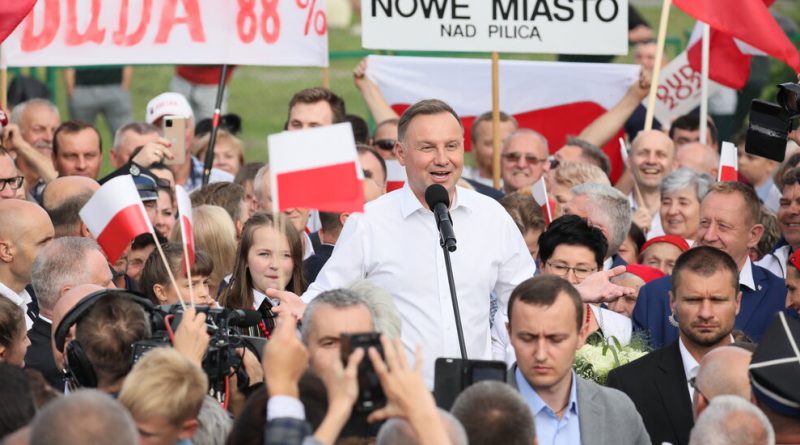Poland’s Supreme Court Declares Presidential Election Valid
[ad_1]
Poland’s Supreme Court on Monday upheld the results of President Andrzej Duda’s narrow victory in presidential elections last month, the country’s closest contest since the fall of communism in 1989, a decision that clears the path for the country’s conservative Law and Justice party to continue in power.
Thousands of supporters of the opposition candidate and rights groups had filed legal challenges in the country’s highest court demanding that the election be reassessed after Mr. Duda edged out Rafal Trzaskowski, the opposition candidate and the liberal mayor of Warsaw. Mr. Duda secured 51.03 percent of the vote, while Mr. Trzaskowski won 48.97 percent, in a mid-July runoff.
Opponents of Mr. Duda pointed to many irregularities during the campaign and election, including pushing forward with the vote despite the coronavirus pandemic, limited access to the vote for Poles abroad, and the role of the public media and government officials in the campaign.
Miroslaw Wyrzykowski, a former judge of the country’s constitutional tribunal, was among those who criticized the court’s decision.
“The whole electoral procedure from the beginning until the end violates the Constitution,” he said in an interview. “We will have a president elected in an unconstitutional manner.”
The court’s decision was not a surprise in light of sweeping changes to the country’s judicial system introduced by the governing party, which drew widespread condemnation from the European Union and international human rights organizations, as well as from Poland’s opposition and some of its judges.
The country’s judges had been selected for decades by an independent council, but legislation signed by Mr. Duda in 2017 introduced changes that gave the president more direct power over the Supreme Court.
Joanna Lemanska, who heads the chamber of the Supreme Court that ruled on the validity of the election — and who was appointed by Mr. Duda — had stepped away from the process, but critics said her departure was not enough to remove the likelihood of bias.
“I had no doubt what the decision would be,” said Michal Wawrykiewicz, a lawyer from the Free Courts Initiative and the Committee for Defense of Justice. “We are not talking here about an independent court, but a party tribunal.”
Mr. Wawrykiewicz pointed out that the court had ruled that an overwhelming majority of complaints did not fulfill the formal criteria, and were not even assessed on the grounds of their merit.
“The European Court of Justice will rule on Sept. 22 whether the chamber of the Supreme Court fulfills the criteria of an independent court,” he said, “which will give us answers to many questions.”
Given the margin of defeat — almost half a million votes — the supporters of Mr. Trzaskowski who lodged complaints after the election said the move was not intended to overturn the result of the election, but to publicly question the validity of the vote and demonstrate that the elections were unfair.
“These elections were not equal, didn’t meet democratic standards, they were dishonest,” Borys Budka, the head of the main opposition party, Civic Platform, said after the election. “Because of that, we demand that they are declared invalid.”
Other opposition members of Parliament echoed his concern, including Kamila Gasiuk-Pihowicz, who questioned the decision in a post on Twitter and added, “Who needs a Supreme Court that will accept everything the authorities want?”
The majority of issues with the election were reported by voters from abroad, where tens of thousands of a record 520,000 ballots may have gone uncounted.
In Britain, more than 30,000 ballots — 16.6 percent of the total number of registered Polish voters in that country — went missing, according to the newspaper Gazeta Wyborcza. Cezary Tomczyk, the head of Mr. Trzaskowski’s campaign, said it had also received reports from across Poland of ballots that were not properly stamped, a requirement for them to be validated.
Some of the claims filed to the court that questioned the validity of the election concerned the role of the country’s public media in what critics called an unfair electoral campaign.
But on Monday the court determined that the activity of public media outlets during the campaign did not limit free choice.
Representatives from the Organization for Security and Cooperation in Europe, which sent an election monitoring mission to Poland, said that the public media had “failed in its duty to offer balanced and impartial coverage.” Instead, it said, the media “acted as a campaign vehicle for the incumbent and frequently portrayed his main challenger as a threat to Polish values and national interests.”
Even if the vote itself is considered fair, “the use of public funds, the engagement of the so-called public media, caused the situation to be unequal,” said Mr. Budka of the opposition.
Aleksander Stepkowski, the spokesman for the Supreme Court, said on Sunday that the court had processed all of the complaints, and found 93 of the 5,847 complaints valid, not enough to influence the overall result of the election.
The court said that the complaint filed by Mr. Trzaskowski’s campaign committee did not contain sufficient proof to sustain its claims.
Anatol Magdziarz contributed reporting.
